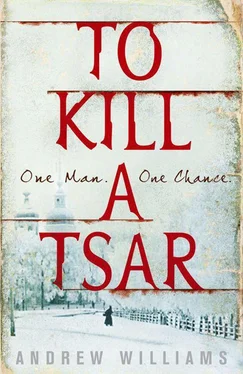‘Yes,’ said Dobrshinsky, turning his sharp little eyes upon his colleague again. ‘He was one of them and he was one of us. He’s a lucky man.’
‘Lucky indeed — they almost finished him off.’
‘No, no, Barclay, I don’t mean that,’ the investigator replied with a sardonic smile. ‘My dear fellow, he’s lucky because who would dare to arrest him now?’
30 MARCH 1880
78 MOIKA EMBANKMENT
The pianoforte was in a drawing room on the floor above but the door was ajar and the deliberate melody of the prelude was ringing on the marble stairs and in the hall. Anton Dobrshinsky stood and listened with pleasure and surprise, for a highly accomplished performance of Chopin was not what he expected to hear in the count’s house.
‘The fellow from the Conservatory. My wife’s invited some guests for a musical soirée.’ Von Plehve had come to stand beside him at the foot of the stairs. ‘Do you think he’s good?’
‘He plays beautifully.’
‘I’m glad you think so. Her Highness Princess Dolgorukaya will be here, and the British ambassador and his wife.’ Von Plehve touched Dobrshinsky’s elbow and led him across the hall into his study.
Yellow evening light was pouring through the windows overlooking the Moika, shifting in the swirling smoke from the fire and softening the cold gilt edges of the room. It was expensively but unimaginatively decorated with delicate but uncomfortable furniture and dark Flemish pictures with Old Testament themes.
‘I want you to see this before my man delivers it,’ said von Plehve, picking up a letter. ‘Please,’ and he indicated with a casual wave that Dobrshinsky should take the library chair in front of his desk. The letter was marked ‘Strictly Confidential’ and carried that day’s date.
To the Chairman of the Supreme Security Commission, His Excellency, General Count Loris-Melikov
Your Excellency,
I have the honour to report that I visited this morning The Earl of Dufferin, the British Ambassador, and spoke with him for nearly an hour. In the course of our meeting, the ambassador asked his military attaché, Colonel Gonne, to join us. I inquired after the health of the English doctor, Frederick Hadfield, and was assured he was making good progress. As Your Excellency will no doubt be aware, Dr Hadfield is recuperating from his injuries at the home of his uncle, General Glen.
Turning to the matter of Hadfield’s contacts with the terrorists, in particular the woman, Romanko, Lord Dufferin wished to repeat his confidence in the doctor’s innocence. He also asked me to reassure Your Excellency that the British government was not involved in a conspiracy to undermine His Majesty or the Russian government, and would do all it could to prevent and condemn terrorist violence. The military attaché, Colonel Gonne, has spoken to the correspondent of The Times newspaper in the city. It is the opinion of Mr George Dobson that the doctor is nothing worse than a liberal. He described the doctor as a little naïve, and raised the possibility that he had become infatuated with the Romanko woman while he was working beside her at a clinic for the poor.
It seems unlikely the doctor offered any material assistance to the terrorists and in view of their attempt to murder him there can be no question of his maintaining any further contact. Mr Dobson has undertaken to keep Colonel Gonne informed of the doctor’s state of mind and movements. It is the firmly held view of Lord Dufferin that the doctor should be allowed to continue with his work and that an attempt to bring a case against him based on the flimsiest of evidence would damage relations between our two countries. Furthermore, it would be the cause of some consternation in diplomatic and expatriate circles in the city.
Your Excellency may wish to consider the doctor’s family connection and close association with a number of influential people. I believe His Majesty met the doctor when he was visiting the survivors of the explosion at the palace and has sent him a message expressing his sympathy and appreciation.
To conclude, I emphasised to Lord Dufferin the unofficial nature of my representations and was assured by him that our conversation would go no further. It was agreed in the circumstances that it would be in everyone’s interests if the political nature of the assault on Dr Hadfield were suppressed and newspapers encouraged to report that he was set upon by common thieves. As Your Excellency observed, ‘This is a small cloud that might be left to pass.’
I have the honour to be, with the highest respect, Your Excellency’s humble and obedient servant, Count Vyacheslav Konstantinovich von Plehve
Dobrshinsky looked up from the letter and caught the count’s eye.
‘It was a delicate business, as you can imagine, but I pride myself that no one could have managed it with more finesse,’ said von Plehve. ‘You can question the Englishman again, of course.’
‘I have, already. He had nothing more to say,’ Dobrshinsky replied.
‘I hope the terrorists have beaten some sense into him.’ The chief prosecutor reached across the desk to offer Dobrshinsky the cigarette box. ‘No?’ The count took one himself, rubbed it gently between his fingers then lit it, drawing in the sharp smoke with pleasure. ‘His Excellency, Count Loris-Melikov, is satisfied that we are making some progress at last, thanks to the Jew’s testimony.’
Dobrshinsky frowned and lifted an unsteady hand to his temple. ‘We’ve made arrests but most of the members of their executive committee are still at liberty.’
‘But not for long, Anton Frankzevich, I’m sure, not for long. I’ve told His Excellency that you have them in your sights,’ said von Plehve.
Dobrshinsky did not reply but gazed impassively across the desk at him. Was there a more unscrupulous cultivator of connections and influence than the chief prosecutor? he wondered.
‘I didn’t mention your fear that the terrorists have a well placed informer in the Third Section,’ von Plehve said, shifting uncomfortably in his chair. ‘I judged it something His Excellency does not need to be troubled with. I am confident you will find him soon.’
Dobrshinsky continued to stare at him, watching as he picked up his pen and put it down again then ground his cigarette into a brass ashtray.
‘Well?’ von Plehve said, irritably.
‘I can offer little hope of detecting the informer at present.’
‘Didn’t Goldenberg give you clues? What about the other prisoners?’
‘The little I have been able to tease from them adds nothing to our understanding. Goldenberg was able to help a little.’ Dobrshinsky paused and closed his eyes for a second, pressing two fingers against his temple again. ‘No. You see, I think there is only one man who knows the identity of the informer and that is Alexander Mikhailov.’
The chief prosecutor grunted crossly. ‘Well, can’t you find some way to trap the informer?’ he asked.
‘We’re looking into possibilities. Major Barclay is monitoring the activities of some of our agents,’ said Dobrshinsky, choosing his words carefully. Then, after a moment’s thought, ‘But Mikhailov is the key.’
‘I see.’ Von Plehve returned his gaze for a moment then rose abruptly to his feet to indicate the interview was over. But he paused at the study door with his chubby hand on the knob. ‘You speak a little Polish, Anton Frankzevich, don’t you?’
‘A little, yes.’
‘Are you familiar with the proverb, Nieznajomość prawa szkodzi ? Ignorance is no sort of excuse. No? Actually, I think it is a peculiarly Russian sentiment.’ An easy little smile was playing on the count’s lips. ‘It pays for those of us in the tsar’s service to bear this proverb in mind at all times. I will inform His Excellency of your confidence that the investigation is progressing well.’
Читать дальше












